Putting Earth Into Play: Investigating the Impact of Sport on Our Spaces & Places

a Discovery Core Experience
May be taken as either BCORE 110 (Natural Sciences), or BCORE 107 (Social Sciences)
About This Course
Sports can be defining. They shape personal lives and friendships, connections within communities, and impact the environment in ways large and small. In this course we will explore how resource use in sports, from water to maintain green fields, construction of new stadiums, the use of shared land for outdoor recreation, and travel to events all impact our environment. We’ll explore different ways of defining value and impact, considering economics, environment, community, and personal growth and learn about innovators in both technological and social change that will let us stay connected through sport while decreasing negative impacts on the world around us.
How We Learn?
The course will be broken into four sections, beginning with an exploration of interdisciplinary thinking and ways to approach a question from different points of view. We’ll ask “why sports matter” and consider how we could respond to the question with answers that are personal, economic, cultural, qualitative or quantitative. We’ll then turn to three topical units; water quality, climate change, and land use. Each section will include background on key environmental issues, examples of impact and future-looking change, and an opportunity to connect with groups doing work in the field.
What Will We Learn?
We’ll kick off the course with this question to practice group discussion, use the library to find different kinds of sources, and establish our personal interests and connections in the topic of sport. As a first-year Discovery Core course, this is a chance to ground the course in some key introductions to learning practices at UWB and build norms around research, writing, and collaboration. The course will roughly be divided into the following units:
Unit 1: Water for What?
This unit will focus on what makes water limiting in different parts of the world, with a focus on the Pacific Northwest. Students will learn about surface water, groundwater, wastewater management, and water pollution through examples including community water monitoring projects driven by sport (for example, the attention brought to pollution in the Seine during the Paris Olympics, and local examples of rowing and paddling clubs that do water monitoring and trash pickup) and innovative technological solutions to water-intensive field sports (such as recycling of wastewater for irrigation at Brightwater). We’ll focus on data-driven questions in this section and talk about the use and display of quantitative data.
Unit 2: Does It Matter How We Get There?
This unit will focus on climate change and emissions from travel. We’ll start with a review of greenhouse gas impacts and state-wide and global emissions reduction targets, the look at both individual and institutional choices that impact emissions. Examples and connections might include a visit with bike-based outdoors enthusiasts, a film screening from Protect our Winters as possible connections. This section will focus on ideas around individual and collection action and advocacy.
Unit 3: The Land We Love
In this section, I imagine focusing on land use in both urban and rural contexts. We’ll look at the land use trade-offs and emissions implications of stadium and venue construction; learn about more sustainable innovations in building design; and discuss rights and practices in land use on publicly owned lands and tribal lands present and historic. I would look for connections here with stadium sustainability programs, perhaps make a specific connection with the World Cup, and I’d like to connect with the Snoqualmie Tribe Ancestral Lands Movement — particularly around their social media engagement strategies. Students would focus here on ideas of community.
Professor Avery Shinneman (She/Her/Hers)
School of Interdisciplinary Arts & Sciences

About Dr. Shinneman
B.A., Geology and Environmental Studies, Macalester College
Ph.D., Geology, University of Minnesota
I teach environmental science courses that are focused on the process we go through to investigate and begin to understand the environmental systems we live in. My intention is that students leave my courses with a better understanding of both the earth system/process the class is focused on (water resources, geology, etc.) and the way we go about investigating that process. Most of my classes involve individual research, experiential learning at outdoor field sites or local environmental agencies, and significant hands-on problem solving. My main focus is to teach students how to navigate the often messy process of discovery. I believe strongly that many controversies in the public discourse about science, including debates about climate change, evolution, and medicine, stem from the fact that too many people see science as a text book that has already been written instead of as a dynamic process. I want to encourage students to look at science as something they can actively create and evaluate, rather than something that is handed to them as a set of predetermined conclusions. My desire is that each student leaves one of my courses better able to use evidence in decision making, discuss the uncertainties and errors in scientific research, and apply the knowledge of the course to a relevant problem.
Research/Scholarship
My research interests are focused on developing records of recent and long-term changes in the environment, especially in aquatic systems, arising from shifts in climate and land-use. Using biological and geochemical archives in lake sediment cores, I develop reconstructions of paleo-ecological changes. These reconstructions can be used to answer a variety of questions about natural variability in ecological systems, changes in these systems after anthropogenic disturbances, and the efficacy of restoration efforts.
Contact
Email: alcs@uw.edu